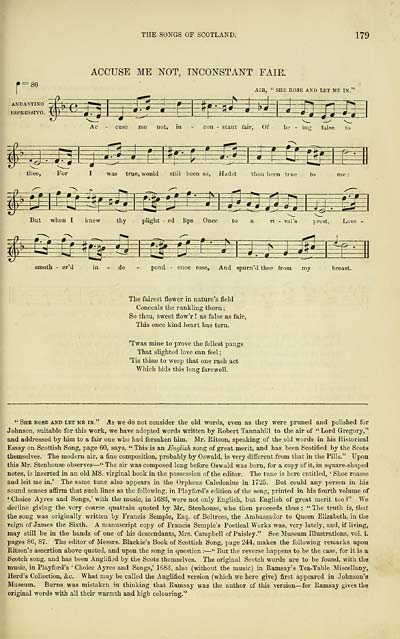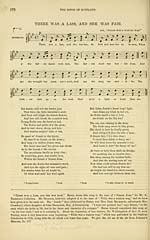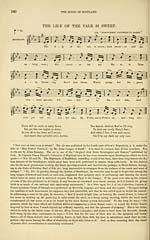Glen Collection of printed music > Printed music > Wood's edition of the songs of Scotland
(203) Page 179 - Accuse me not, inconstant fair
Download files
Complete book:
Individual page:
Thumbnail gallery: Grid view | List view

THE SONGS OF SCOTLAND.
179
ACCUSE ME NOT, INCONSTANT FAIR
,• = 80
ANDANTINO
KSl'KESSIVO.
AIR, " SnE ROSE AND LET ME IN.
fe
=S=I
St-
J+T+—1-
:fef
*=t
=fc
T 4 J_S *-*— I
EJEEtEsEEjESE?
Ac - cuse me not, in - con - stant fair, Of be - ing false to
fcLZfZ
E^£
thee, For I was true, would still been so, Hadst tliou been true to me:
t^fi
r=E
MEE^E*
m
i^L
E
- *-■- »
But when I knew tliy plight - ed lips Once to a ri - val's prest, Love
— , — e=i— .— =>
^
JBgEEPB^g^^^hl
■t-a
smoth - er'd
de
pond - ence rose, And spurn'd thee from my breast.
The fairest flower in nature's field
Conceals the rankling thorn ;
So thou, sweet flow'r ! as false as fair,
This once kind heart has torn.
'Twas mine to prove the fellest pangs
That slighted love can feel ;
'Tis thine to weep that one rash act
Which bids this long farewell.
" She rose and let me in." As we do not consider the old words, even as they were pruned and polished for
Johnson, suitable for this work, we have adopted words written by Robert Tannahill to the air of " Lord Gregory,"
and addressed by him to a fair one who had forsaken him. Mr. Eitson, speaking of the old words in his Historical
Essay on Scottish Song, page 60, says, " This is an English song of great merit, and has been Scotified by the Scots
themselves. The modern air, a fine composition, probably by Oswald, is very different from that in the Pills." Upon
this Mr. Stenhouse observes — " The air was composed long before Oswald was born, for a copy of it, in square-shaped
notes, is inserted in an old MS. virginal book in the possession of the editor. The tune is here entitled, ' Shoe roasse
and leit me in.' The same tune also appears in the Orpheus Caledonius in 1725. But could any person in his
sound senses affirm that such lines as the following, in Playford's edition of the song, printed in his fourth volume of
' Choice Ayres and Songs,' with the music, in 1683, were not only English, but English of great merit too i" We
decline giving the very coarse quatrain quoted by Mr. Stenhouse, who then proceeds thus : " The truth is, that
the song was originally written by Francis Semple, Esq. of Beltrees, the Ambassador to Queen Elizabeth, in the
reign of James the Sixth. A manuscript copy of Francis Semple's Poetical Works was, very lately, and, if living,
may still be in the hands of one of his descendants, Mrs. Campbell of Paisley." See Museum Illustrations, vol. i.
pages 86, 87. The editor of Messrs. Blackie's Book of Scottish Song, page 244, makes the following remarks upon
Ritson's assertion above quoted, and upon the song in question : — " But the reverse happens to be the case, for it is a
Scotch song, and has been Anglifiad by the Scots themselves. The original Scotch words are to be found, with the
music, in Playford's ' Choice Ayres and Songs,' 1683, also (without the music) in Ramsay's Tea-Table Miscellany,
Herd's Collection, &c. What may be called the Anglified version (which we here give) first appeared in Johnson's
Museum. Burns was mistaken in thinking that Ramsay was the author of this version — for Ramsay gives the
original words with all their warmth and high colouring."
179
ACCUSE ME NOT, INCONSTANT FAIR
,• = 80
ANDANTINO
KSl'KESSIVO.
AIR, " SnE ROSE AND LET ME IN.
fe
=S=I
St-
J+T+—1-
:fef
*=t
=fc
T 4 J_S *-*— I
EJEEtEsEEjESE?
Ac - cuse me not, in - con - stant fair, Of be - ing false to
fcLZfZ
E^£
thee, For I was true, would still been so, Hadst tliou been true to me:
t^fi
r=E
MEE^E*
m
i^L
E
- *-■- »
But when I knew tliy plight - ed lips Once to a ri - val's prest, Love
— , — e=i— .— =>
^
JBgEEPB^g^^^hl
■t-a
smoth - er'd
de
pond - ence rose, And spurn'd thee from my breast.
The fairest flower in nature's field
Conceals the rankling thorn ;
So thou, sweet flow'r ! as false as fair,
This once kind heart has torn.
'Twas mine to prove the fellest pangs
That slighted love can feel ;
'Tis thine to weep that one rash act
Which bids this long farewell.
" She rose and let me in." As we do not consider the old words, even as they were pruned and polished for
Johnson, suitable for this work, we have adopted words written by Robert Tannahill to the air of " Lord Gregory,"
and addressed by him to a fair one who had forsaken him. Mr. Eitson, speaking of the old words in his Historical
Essay on Scottish Song, page 60, says, " This is an English song of great merit, and has been Scotified by the Scots
themselves. The modern air, a fine composition, probably by Oswald, is very different from that in the Pills." Upon
this Mr. Stenhouse observes — " The air was composed long before Oswald was born, for a copy of it, in square-shaped
notes, is inserted in an old MS. virginal book in the possession of the editor. The tune is here entitled, ' Shoe roasse
and leit me in.' The same tune also appears in the Orpheus Caledonius in 1725. But could any person in his
sound senses affirm that such lines as the following, in Playford's edition of the song, printed in his fourth volume of
' Choice Ayres and Songs,' with the music, in 1683, were not only English, but English of great merit too i" We
decline giving the very coarse quatrain quoted by Mr. Stenhouse, who then proceeds thus : " The truth is, that
the song was originally written by Francis Semple, Esq. of Beltrees, the Ambassador to Queen Elizabeth, in the
reign of James the Sixth. A manuscript copy of Francis Semple's Poetical Works was, very lately, and, if living,
may still be in the hands of one of his descendants, Mrs. Campbell of Paisley." See Museum Illustrations, vol. i.
pages 86, 87. The editor of Messrs. Blackie's Book of Scottish Song, page 244, makes the following remarks upon
Ritson's assertion above quoted, and upon the song in question : — " But the reverse happens to be the case, for it is a
Scotch song, and has been Anglifiad by the Scots themselves. The original Scotch words are to be found, with the
music, in Playford's ' Choice Ayres and Songs,' 1683, also (without the music) in Ramsay's Tea-Table Miscellany,
Herd's Collection, &c. What may be called the Anglified version (which we here give) first appeared in Johnson's
Museum. Burns was mistaken in thinking that Ramsay was the author of this version — for Ramsay gives the
original words with all their warmth and high colouring."
Set display mode to: Large image | Transcription
Images and transcriptions on this page, including medium image downloads, may be used under the Creative Commons Attribution 4.0 International Licence unless otherwise stated. ![]()
| Special collections of printed music > Glen Collection of printed music > Printed music > Wood's edition of the songs of Scotland > (203) Page 179 - Accuse me not, inconstant fair |
|---|
| Permanent URL | https://digital.nls.uk/91340179 |
|---|
| Description | Scottish songs and music of the 18th and early 19th centuries, including music for the Highland bagpipe. These are selected items from the collection of John Glen (1833 to 1904). Also includes a few manuscripts, some treatises, and other books on the subject. |
|---|
| Description | The Glen Collection and the Inglis Collection represent mainly 18th and 19th century Scottish music, including Scottish songs. The collections of Berlioz and Verdi collected by bibliographer Cecil Hopkinson contain contemporary and later editions of the works of the two composers Berlioz and Verdi. |
|---|

